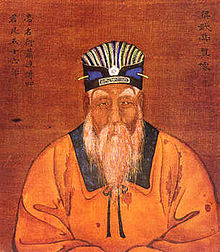Emperor Wu of Liang
| Xiao Yan | |||||||||||||
|---|---|---|---|---|---|---|---|---|---|---|---|---|---|
 |
|||||||||||||
| Emperor of the Liang Dynasty | |||||||||||||
| Reign | 502–549 | ||||||||||||
| Predecessor | dynasty established, Emperor He as Emperor of Southern Qi | ||||||||||||
| Successor | Emperor Jianwen | ||||||||||||
| Born | 464 | ||||||||||||
| Died | 549 (aged 85) | ||||||||||||
| Spouse | Empress De | ||||||||||||
| Issue |
Xiao Tong, Crown Prince Zhaoming Xiao Zong, Prince of Yuzhang Xiao Gang, Emperor Jianwen Xiao Ji, Prince Jian of Nankang Xiao Xu, Prince Wei of Luling Xiao Guan, Prince Xi of Shaoling Xiao Yi, Emperor Yuan Xiao Ji, Prince of Wuling Princess Lin'an Princess Changcheng Princess Yongxing Princess Yongshi Princess Yongkang Princess Anji Princess Yongjia Princess Fuyang |
||||||||||||
|
|||||||||||||
| Father | Xiao Shunzhi | ||||||||||||
| Mother | Zhang Shangrou | ||||||||||||
| Full name | |
|---|---|
|
Family name: Xiāo (蕭) Given name: Yǎn (衍) |
|
| Posthumous name | |
| Wǔ (武), literary meaning: "martial" |
|
| Temple name | |
| Gāozǔ (高祖) |
Emperor Wu of Liang (梁武帝) (464–549), personal name Xiao Yan (蕭衍), courtesy name Shuda (叔達), nickname Lian'er (練兒), was the founding emperor of the Liang Dynasty of Chinese history. His reign, until the end, was one of the most stable and prosperous during the Southern Dynasties.
Emperor Wu created universities and extending the Confucian civil service exams, demanding that sons of nobles study. He was well read himself and wrote poetry and patronized the arts. Although for governmental affairs he was Confucian in values, he embraced Buddhism as well. He himself was attracted to many Indian traditions. He banned the sacrifice of animals and was against execution. It was said that he received the Buddhist precepts during his reign, earning him the nickname The Bodhisattva Emperor. The Emperor is the namesake of the Emperor Liang Jeweled Repentance (梁皇寳懺), a widely read and major Buddhist text in China and Korea.
At the end of his reign, his overly lenient attitude on his clan's and officials' corruption and lack of dedication to the state came at a heavy price; when the general Hou Jing rebelled, few came to his aid, and Hou captured the capital Jiankang, holding Emperor Wu and his successor Emperor Jianwen under close control and plunging the entire Liang state into anarchy. Emperor Liang himself died while under house arrest, with some historians believing that Hou starved him to death.
Xiao Yan was born in 464, during the reign of Emperor Xiaowu of Liu Song. His father Xiao Shunzhi (蕭順之), who claimed ancestry from the great Han Dynasty prime minister Xiao He, was a distant cousin of the Liu Song general Xiao Daocheng, and was part of Xiao Daocheng's close circle of advisors in Xiao Daocheng's eventual seizure of the Liu Song throne and establishment of Southern Qi (as its Emperor Gao) in 479. For Xiao Shunzhi's contributions, Xiao Daocheng created him the Marquess of Linxiang and made him a general. Xiao Yan was Xiao Shunzhi's third son, and his mother was Xiao Shunzhi's wife Zhang Zhirou (張至柔), who was also the mother of his older brothers Xiao Yi (蕭懿) and Xiao Fu (蕭敷), his younger brother Xiao Chang (蕭暢), and his younger sister Xiao Linyi (蕭令嫕). Lady Zhang died in 471, predating Xiao Shunzhi's becoming a marquess during Southern Qi.
...
Wikipedia
